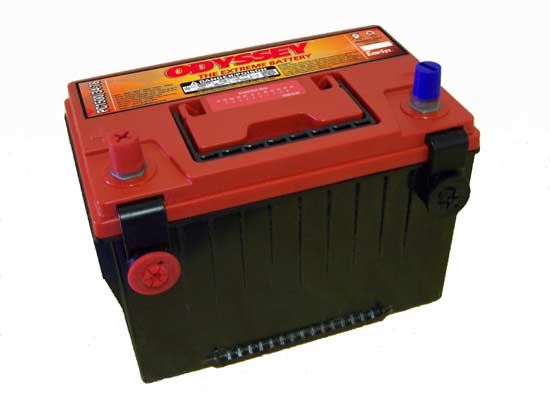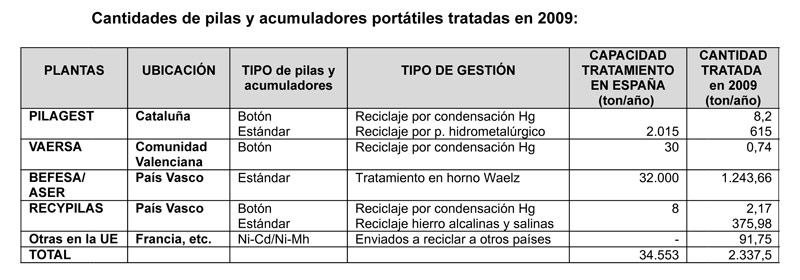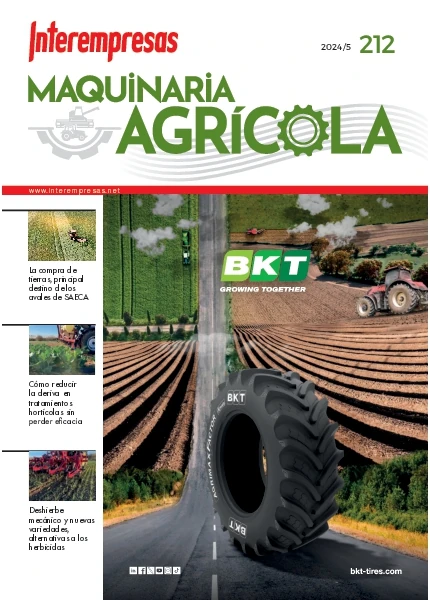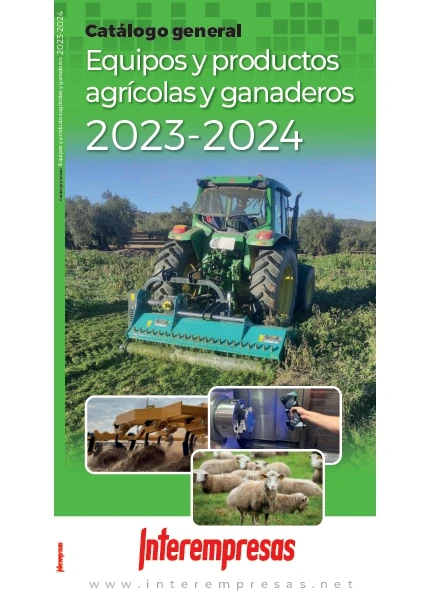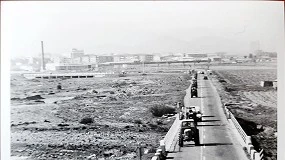When the batteries die
on February 15, 2011
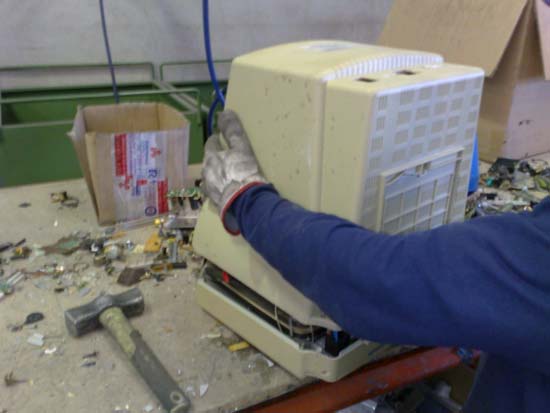
What happens when a company producing batteries no longer exists and has not recovered for recycling, how the law requires, the material that put on the market? How to organize to meet collection when there are batteries with different life expectancy? What role plays in this reduction of nickel cadmium in the composition of cells and batteries? What is the room for manoeuvre of the metalworkers?
These are issues that the professionals in the sector put on the table during the day January 27 organized the Unibat GIS, of recent Constitution. The meeting was the approximation made by Rafael Acedo, technical adviser of the Ministry of environment, on the Royal Decree governing the management of waste and laying down rights and obligations of producers and importers.
Long way
In fact, Spain, batteries and portable batteries collected 18% in 2007, according to data of the Ministry of the environment. "I think that it is a percentage which is not far from the desirable 25 %". "Spain less than the value of France, Belgium or Germany, but is well positioned," opined the ministerial technical.
What happens with 82% of this type of pollutant waste that are not collected will lead to garbage containers, what follows it is still much to be done and that such waste end up contaminating aquifers which reverts, at the same time, human and animal consumption.
Another issue that was put on the table during the Conference was the future and final elimination of the use of nickel cadmium - and his replacement, for example, by lead-which is currently prohibited in batteries and accumulators, with few exceptions, such as its use in batteries for wireless power tools. "We are thinking in the European Union to prohibit the content of cadmium in batteries, batteries and accumulators which are intended for those tools." "It is working so that this exception be removed", he explained Acedo.

Collection in the Spanish territory according to RD 106/2008 targets
- Portable: index of collection of 25% from 31-12-2011
- Portable: index of collection of 45% as of 31-12-2015
- Automotive: collected annual 90%, as of 31-12-2009
- Automotive: collected annual 95%, from the 31-11-2011
- Industrial cadmium: annual collection of 95%, from 3-12-2011
Definitions to be clear
The technical adviser of the Ministry of the environment had no hesitation in starting his presentation explaining some basic terms that handles the legislation in force.
Battery: source of electrical energy obtained through direct transformation of energy chemical and consists of one or more primary (non-rechargeable) elements.
Accumulator: source of electrical energy generated by direct conversion of energy chemical and consists of one or more secondary (rechargeable) elements.
Battery or accumulator industrial: battery or accumulator designed exclusively for industrial or professional or used in any type of electric vehicle.
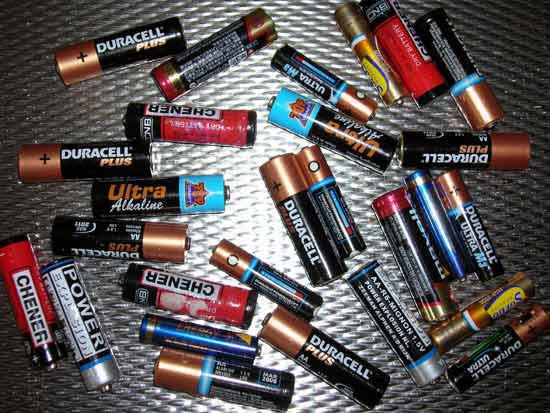
Battery or accumulator laptop: battery, accumulator or battery that is sealed, can carry in your hand and is not industrial or automotive.
Drums: set of batteries or accumulators that are connected to each other, forming a unit integrated and closed within an outer casing. For example: industrial and automotive batteries.
Producer: any natural or legal person that places for the first time on the market the batteries or accumulators, including the incorporated into appliances or vehicles, in the framework of a professional activity.
Distributor: any natural or legal person who sells or supplies batteries or accumulators to an end-user as part of a professional activity
Waste of battery or accumulator: battery, accumulator or battery, which its holder it transpires or intends to discard.
Is not the same managing waste from a battery to a stack button
"Is not the same address as waste a stack tiny stick, which can be in the Pocket, that a battery that can weigh 500 pounds, or more", said Marcel Mongay, lawyer and director of operations of Unibat, justifying that this integrated management system is to respond precisely to that part of the sector dealing with large volumes. The majority of businessmen who attended the Conference already knew this recent GIS, whose role, he said Mongay, is "in the end, save costs to the producer, because it delegates this responsibility to a third party, which is the Association and which makes it work to certify that their waste flow the way that makes the law".
The role of such agencies is to facilitate actions that should occur at the end of the lifespan of such waste. In this regard, for example, GIS guarantees the traceability that allows it to take control of the waste at all times "even 20 years, in the case of nickel cadmium." "We will provide this coverage, with a reduction in costs and, Furthermore, have the dialogue with the Administration", explained Mongay.
The operations of Unibat acknowledged that, while large multinational companies have own legal departments concerned "with manternerles the day of the new legislation", in the case of smaller importers do not always is the case, and they are even surprised when Unibat contact them: "The first reaction most is that you going them to sell something". According to Mongay, there are certain reticence among the professionals of the sector to join or form part of an integrated system of management, "because involve them a cost", but help them to comply with the law.
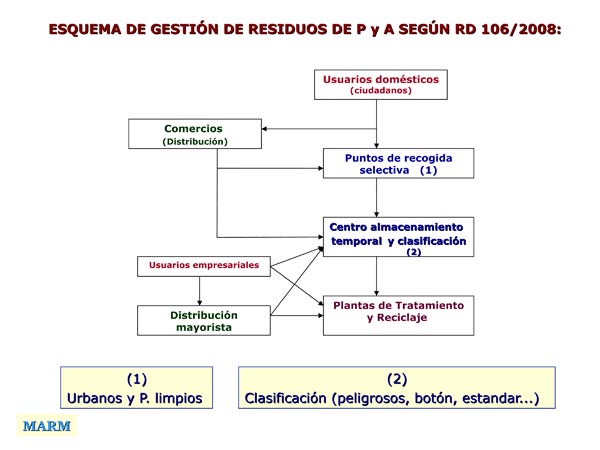
Unibat: refereeing
Union of industries of the Bateria S.L (Unibat) is defined as a society non-profit that is born, according to its head, Marcel Mongay, "by the demand of producers, aware that they were bound by the Royal Decree 106/2008". Unibat stands among its partners as a "referee" for guidance on their obligations as regards compliance with the law and clarify situations of conflict. Unibat aims to promote the formation and operation of an integrated system of management (GIS) for the collection and management of batteries and batteries, in the terms established by the Royal Decree. Among its functions is to develop logistical flows to ensure the collection of this waste in any point of Spain. To do this, says Mongay, "it has the collaboration of carriers, gatherers and managers end".
The majority of partners are in the sector of industrial battery manufacturers and importers, "read by industrial drums which are installed in equipment of airports, trains, boats, trucks (or Bulls) electricity generation." "That means that you it's a volume and considerable weight batteries", explains Mongay.
Unibat operates at the national level, but is headquartered in Badalona (Barcelona). "Our commitment is to go to collect two pounds of batteries to Melilla or la Gomera, or Madrid." Companies that are represented are multinationals, but the corporate headquarters are in Madrid, Bilbao, Zaragoza, Sevillla.... "."
The days of presentation of Unibat counted with the presence of representatives of Acu Spain. Batplus, AEG Power Solutions, as Batteries, Iberia Celectric CSB, Chloride-Emerson, Enersis-Hawker, Meibat, Linde, Still, Toyota, Hoppecke, Saft, Socomec and TAB Spain, among others.
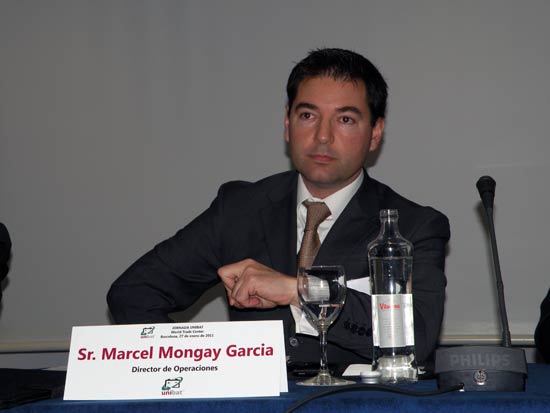
Community legislation
Directive 2008/98/EC, waste framework.Decision 2011/118/EC: European list of waste (LER).
Directive 2006/66/EC of batteries and accumulators.
Regulation (EC) 1013 / 2006 on shipments of waste.
Spanish legislation
Draft Act on waste and contaminated soils.Law 10/1998 of 21 April, on waste.
Order MAM/304/2002, by publishing the LER.
Royal Decree 106/2008 of batteries and accumulators.
Royal Decree 943/2010, by modifying the RD 106/2008.
